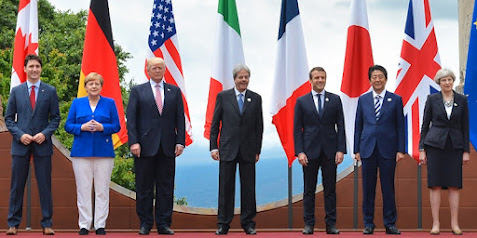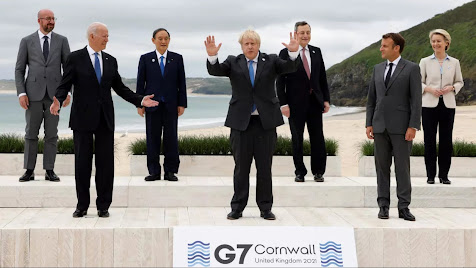I started writing this blog a
couple of days ago, before the resignation of Boris Johnson as leader of the
Conservative Party. Unfortunately he remains Prime Minister until a new leader
is elected. A big mistake, in my view. But more later.
Crisis? What crisis? More to the point, which crisis? There are so many to choose from. Dealing with situations that cause major upheaval across the planet, and consequently threatens the existence of all forms of life, has been one of the more compelling issues confronting world leaders. Attempts at coming together have spawned a variety of international agreements and groups, joining together to find solutions and offering help and assistance in the process.
Two cataclysmic world wars, causing major difficulties for the most advanced economies, brought about, in 1945, the United Nations, an intergovernmental organization whose purpose is to maintain international peace and security, develop friendly relations among nations, achieve international cooperation, and be a centre for harmonizing the actions of nations. The UN has six principal organs: the General Assembly; the Security Council; the Economic and Social Council (ECOSOC); the Trusteeship Council; the International Court of Justice; and the UN Secretariat. There are a multitude of specialised agencies, funds and programmes (World Bank, World Health, World Food, UNESCO, UNICEF. etc.)
On top of this world group, we also have the emergence of the G7. This was originally the G8, and inter-governmental political forum of most wealthy nations including France, United States, United Kingdom, Germany, Japan, Italy, Canada and Russia, which has been suspended since 2014 and has now withdrawn entirely. The President of the European Commission participates as an equal member in all summit events. Their topics for discussion include health, law enforcement, labour, economic and social development, energy, environment, foreign affairs, justice and interior, terrorism and trade. The forum originated around 1975 thirty years after the founding of the United Nations.
Almost fifteen years on, in 1999, we have the formation of the G20, a collection of twenty of the world’s largest economies, conceived as a bloc that would bring together the most important industrialised and developing economies to discuss international economics and financial stability, as well as other pressing global issues. As well as the European Union (EU), the countries are Argentina, Australia, Brazil, Canada, China, France, Germany, India, Indonesia, Italy, Japan, Mexico, Russia, Saudi Arabia, South Africa, South Korea, Turkey, the United Kingdom (UK), and the United States. Spain is invited as a permanent guest.
The G20 apparently represent 80% of global economic output and about 60% of the world’s population. The G7 produce about 53% of global net wealth, and if one includes the whole of the European Union, it rises to 60%. As most of the G7 are also members of the G20, the additional 13 nations, therefore, account for some 20% of global net wealth.
Nonetheless, like all organisations, they are only as effective as the individual participants are willing to make it so. The various upheavals around the world, most notably the middle east, the horn of Africa, the far east and most recently Eastern Europe, seem to indicate a rather sad lack of effectiveness on the part of world leaders.
Their group summits produce the occasional trade agreement and the Group Photo op, all smiles and congratulations. Here are a few past pictures of members.
My point is, that with all these organisations set up to keep the peace round the world, the entire United Nations, the G20 and G7 seem powerless to stop Vladimir Putin’s military operation, which he knows very well is outrageous bluster and the most shameful and disgraceful act of any world leader in the 21st century, perhaps even greater that any in the 20th century, simply because he knows better. His excuses for land and power grabbing are lame in the extreme. He has only succeeded in extending the existing military alliance in the North Western Hemisphere and comes closer, daily, to extending the hostilities and the violence. This is a man on too many steroids. His behaviour is akin to those American teenagers, shooting up schools, because they feel neglected and want some attention. It would be simply tragic if the damage he has done was similar to that, but his demonstration of petulance has gone way beyond tragic into major catastrophic criminal behaviour. Whether he ever answers for it will depend, in the long run of the will of the United Nations and the International Court of Justice; as well as the G7 and G20.
That he has bamboozled the Russian people into believing the explanations for his actions is perhaps not surprising, in a country that appears to be conditioned to be ruled by tyrants. Their best shot at freedom and possible unified democracy in 1917 was dissipated by men too ideologically rigid and grasping for power that emerged as Stalinism and dictatorships. There was a brief spell in 1989, but, once again precipitating into Vladimir Putin who has effectively ruled for the past 23 years and counting.
The idea of continued rule was equally on the mind of the present Prime Minister of the United Kingdom. In his case, unfortunately for him, there is a free press and still the ability for ministers of the Crown to finally develop some gumption and stand up against mendacity, deception and arrogant stupidity. The United Kingdom has been a leaderless nation for some time.
The lawyer and author John Mortimer titled his autobiography “Clinging to the Wreckage”, which is a most accurate description of Boris Johnson’s attempts at remaining in office and which continues with his new caretaker position. In my view he should just go. The ludicrous and nonsensical situation of Boris Johnson remaining in office until a new leader is elected is continuing the damage. The proper course of action to take would be a general election in the very near future, as soon as a new leader/prime minister is appointed through the Conservative party’s system of choosing the next leader. The entire electorate should then decide just who should remain in government.
The first thing on any new government’s agenda is for a more properly democratic electoral system is put in place. There should also be put in place an effective method or getting rid of a prime minister who has clearly lost credibility to continue in the office. It should not just be a single party’s decision, but a non-partisan committee of MP’s who have the power to dismiss the Prime Minister for ‘cause’. A sort of impeachment committee if you will, and it would be the entire Parliamentary body who would make the final decision.
Any party leader who assumes the position of Prime Minister, is meant to be a representative of the entire country. As a consequence of being given this position, it should fall to the whole of the parliament, the people’s representatives as a whole, who should have a say in whether or not the person holding the office should no longer have it. That does not mean that whatever party is in government cannot take their own action, but the country should not be in a similar position again, unable to remove a miscreant from office, when it is clear that a Prime Minister’s gross misconduct is in question.
A party may have its own reasons for removing a leader, which may be for party political reasons, but when it comes to breaches of codes of conduct, the rule of law, or any serious misconduct, then it should be open to the whole of the parliamentary body to have a say in his or her immediate removal from office.
The contrast between the
departure of Teresa May or even Margaret Thatcher, and that of Boris Johnson
are a clear instance of, on the one hand, disputes relating to political policy,
and on the other, instances of breaking the law and the serial mendacious misleading
of Parliament. These are quite different matters. Both Thatcher and May gave up
somewhat graciously, and did not ferociously continue with false aggrandisement
to claim ignorance of his lies and boasts of a so called personal mandate that does
not in fact exist. His delusions are unforgivable, which is why he should just
go.
The majority of the electorate did not support the conservative party, and certainly not Boris Johnson. It is only because of a first past the post system that the party has this ridiculous majority. That must change. Why journalist keep referring to the parliamentary majority as a mandate of the people is beyond me. Do the math for Christ’s sake. It is not a mandate of the people. It may be a mandate from the party, but that is something quite different again. It is a consequence of the system. It is far from a truly democratic mandate of the people. Winning an election in the UK is a mandate of the few, by the few, for the few; it has nothing to do with the majority of the electorate. Again, that must change.
Keir Starmer goes on about a fresh start for the country. I wonder if he just means a different group of people being in government, running along the same lines and system, or a truly fresh start with the implementation of a much more democratic electoral system, perhaps making things more difficult, but at least government with a real people’s mandate. A government that actually represents the whole of the country, not just a party political agenda, but a multiple of agenda’s that take into account the desires and views of the variety and multicultural electorate that exist in the UK. Not an easy proposition, I know, and one that may be cumbersome, but it would reflect the needs of the population, giving voice to many who have none now. Striving to bring unity has got to be better than constant adversarial bickering.
Is that not why we stick with the United Nations and continue, despite the difficulties, with G’s of 7, 8 or 20. I believe at some point, a difference might be achieved. It’s just a matter of will. Perhaps at some point, the continuing pressure brought by these international groups may bring about a peace, one can but hope. If democracies lead by example, then the current glee being expressed by the Kremlin over the departure of Boris Johnson from the scene, might just give way to self-belief and give the Russian people and their political representatives the gumption to deal with the departure of their own serial mendacious head of state. One can but hope.




No comments:
Post a Comment